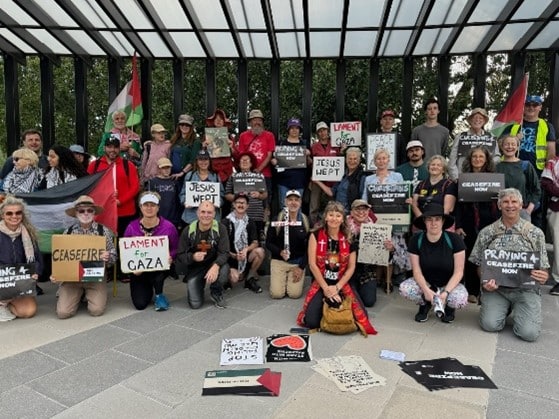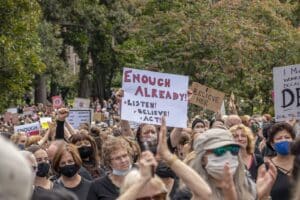
Tim Budge
7 March 2024
It started off light-hearted, almost like a reunion. Forty rag-tag pilgrims with different signs, Palestinian flags and lots of familiar faces, people who have walked for social justice for a long time. It was also a great idea: to walk up to 40 kilometres, marking the distance from the north to the south of Gaza, on Ash Wednesday.
As we walked through the northern suburbs, there were lots of encouraging toots from cars and positive comments from passersby and shopkeepers. Member for Thomastown Bronwyn Halfpenny joined for a few kilometres, as did some representatives from Ged Kearney’s office.
At Thomastown, we stopped at the war memorial and the Reverend Alex Sangster and others led a moving liturgy, recognising that Palestine was one of the places where allied troops fought and died, it felt restorative.
Read more: ‘We shout and plead with God … that this terrible suffering might end’
All Saints Anglican church in Preston welcomed us in, gave us coffee and food, and anointed foreheads with ashes. Outside the Aboriginal Advancement League in Thornbury, we sat on the grass, sang songs, and were reminded of how dispossession and colonialism rob people of land, lives and hope. The mood was becoming more sombre.
At the Saint George Antiochian Orthodox Cathedral, we gathered to hear a young Palestinian woman gave a personal insight into the complexities of being a Palestinian. Then we heard stories from Christians in Gaza, of houses bombed, of 300 people living for weeks at the Church of Saint Porphyrius in Gaza City, which then itself was bombed.
The story seemed bleak and hopeless, because life there has only become worse since those words were written.
I was reminded of how I had visited that church in 2018, I’d marvelled at its history and noted Gazans’ pride in this place of worship. Some 1600 years after its establishment, parts of it have collapsed under Israeli Defence Force attacks, as has most of Gaza Strip.
Read more: Melbourne pilgrims to walk, pray for peace in Gaza as Lent begins
In those words about the conflict in Gaza, outside a church in Thornbury, I was reminded of Gazan friends, people whose homes I had visited, who had provided feasts, whose children had circled the table shyly and who had shared delightedly in the beautiful Palestinian food provided for me as a guest.
I have not heard from those friends since October. Nor have I heard of others: patients, staff and volunteers of the al-Ahli Anglican Hospital who helped with my research and whose lives once revolved around women’s health organisations. There has been nothing, no news, a scary silence.
Into that silence I have inserted images of bombed houses and apartments, of killed and injured family members, of displacement, of hunger and fear. Probably, many of my friends were forced to walk from Gaza City to Rafah to escape the first wave of destruction. And still they wait and try to escape the next, inevitable wave of bombs.
At that church in Thornbury, I was reminded deeply of abandonment, of how our government, much of the worldwide church and so much of public opinion has abandoned the people of Gaza. “It’s complicated”, “Hamas started it”, “If only they would not use violent language”.
Read more: Christians cannot look away from Gaza, we must speak up
In any other country and conflict, the language would not be so careful, or so accommodating of an aggressive military force. Somehow, Gazans, including my friends, have brought this on themselves.
In that moment on the walk, with a deep sense of grief, I was reminded of the Garden of Gethsemane: abandonment, betrayal, aloneness and the spectre of death looming ahead.
Where does light and freedom appear in all of this? I am not sure.
Somehow, it broke through in the Easter story. Will it also happen in Gaza? Are we ready for it? Does our sense of our own place in the world allow for solidarity, for prayer, action and hope? Do we have the courage to see this conflict as the possibility of a breaking open, in the same vein as the fall of the Berlin Wall, the sudden release of Nelson Mandela, the courage of Rosa Parks tipping the balance for Civil Rights in the USA?
This is our moment to align with the arc of justice, but only if we have the courage to refuse the abandonment of the people of Palestine, to embrace solidarity and to see the possibility of the light of the gospel story in the Holy Land in the 2020s.
Tim Budge has been a development and humanitarian worker for over 30 years. He has a PhD in development studies and now lives on Taungurung land in central Victoria.
For more faith news, follow The Melbourne Anglican on Facebook, Instagram, or subscribe to our weekly emails.






